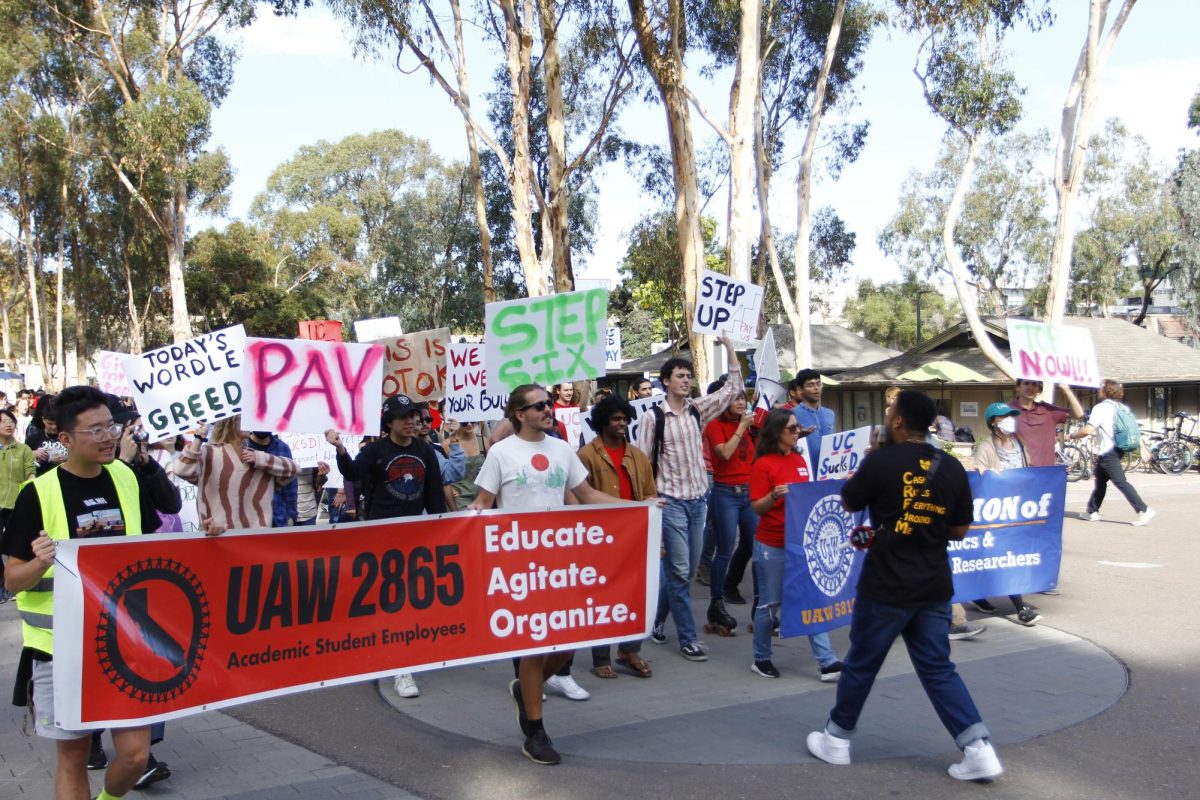On Tuesday, Nov. 14, hundreds of United Auto Workers union members and supporters gathered in front of Geisel Library to celebrate the university dropping all charges against union members previously charged with misconduct and the first anniversary of the historical UAW-UC strike.
Beginning at 12 p.m., the crowd gathered around Geisel Library before walking through Library Walk and marching down Gilman Drive, slowing traffic in the process. The march ended by circling back to the library.
Gatherers chanted “Union Power” while calling for promised wages and union rights. Signs protested the lack of top-ups and wages for hours below what was actually put in, as well as celebratory signs to commemorate the monumental strike. The UAW also hosted similar celebrations across different UC campuses, including UC Berkeley and UCLA.
Last spring, UAW protesters disrupted the UCSD Alumni Awards in La Jolla, surrounding the podium and presenting Chancellor Pradeep Khosla with a sign reading “Most Overpaid Worker Award,” a reference to the Chancellor’s recent privately-funded pay raise.
Following the demonstration, a press release from the representatives of the union claimed that the university charged 67 academic workers — including dozens who were not present in the protest — with physical assault. Later in June, the UAW announced that three UCSD workers were arrested at their homes on felony charges for writing messages in chalk and washable paint on the Ted and Jean Scripps Marine Conservation and Technology Facility, calling on the UC system to stop underpaying its workers.
Earlier this month, the university and the UAW issued a joint statement that all charges were dropped against the UCSD workers who faced arrest, felony charges, and expulsion.
“The Parties look forward to working together collaboratively to resolve issues and other matters in our mutual interests,” the joint statement read.
“This is a victory for all of us in our fight to affirm academic workers’ right to collective action,” UAW commented in the statement. “We should all celebrate our success, and redouble our commitments to fighting the UC for fair pay and working conditions with our ever-growing power.”
One of the grievances UAW has is that the UC is not providing top-ups. Top-ups are the amount a Graduate Student Researcher or Academic Student Employee is paid to make sure they receive the offered funding package of their departments from previous years.
Fronting the picket line and leading the crowd with chants, fourth-year master’s student Alemayehu Bogale looked back at the monumental strike and the process that led to its victory.
“Regular everyday students were having to fight with labor relations people and that’s not our job,” Bogale said. “We don’t know how to negotiate for ourselves like that, but through the help of UAW, we were able to facilitate that process and I think that now we are just stronger for it.”
With an increase in rent and neglect in payment agreements, Bogale shared that several master’s students have opted out of their programs after being faced with harsh financial situations. Bogale hopes that more students will be involved with the union to uphold liveable wages.
“A lot of them say that this is part of the process — we have to struggle to make our way through, but it really shouldn’t be like that,” Bogale said.
Other celebrants shared the aftermath of the ratification and its current effect on union members.
“There are definitely many ways the university has made some progress to upholding the contract, but they are still pretty far away from actually respecting the whole contract they signed with us,” said biomedical Ph.D. student Maya Gosztyla, who also protested during the strike last year. “The university is still processing these issues like under appointments, not giving people top-ups that are preventing us from getting the full raises that are outlined in our contract. I don’t think we’re all the way there yet.”
The 2022 UAW-UC strike marked the largest-ever U.S. higher education strike with a reported 48,000 unionized workers across the University of California’s 10 campuses. After a six-week strike, the unions representing UC student workers and researchers reached an agreement on new contracts, which would go into effect immediately and will be in place through May 31, 2025. The agreement secured the largest-ever increase in wages for any unionized higher education workers and contained additional benefits such as an increase in childcare subsidies, the first-ever remission of dependent healthcare, and guaranteed transit benefits.
In the months following the ratification, tensions remained high with a group of academic workers protesting the university not following through on its agreed contracts.
As one of the 67 members faced with misconduct charges by the university, Goszytla looked back on the significance of the victory for the union.
“This is not just a victory for the 60 or so of us who were directly impacted by the charges, but also for the broader labor movement across the country,” she said. “Many universities are really looking to the UC system as an example of how to behave and how to respond to unions. The fact that we did not let this stand and that we completely won in getting all these charges dropped, sent a really strong message to the other universities that are still in the process of unionizing that this is not a strategy that they should attempt, and if they do, they’ve seen what’s going to happen.”












